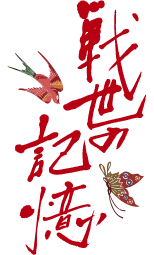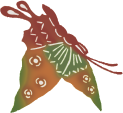
Living Patiently Inside an Air-Raid Shelter
Living Patiently Inside an Air-Raid Shelter
Name: Fumi Matayoshi (24又吉 文)
Place of birth: Kuroshima Island
Age at the time: 25 years old
Status at the time: Undergoing treatment at Airakuen Sanatorium
[When the sound of airplanes stopped]
At the time, we were digging air-raid shelters at night. Because we were young and we didn’t have candles, we lit petroleum, and using that as light, the men would dig air-raid shelters, while young women would fill baskets with the dug up soil to throw them outside. Since we had nothing to eat for lunch, we would stay inside the air-raid shelter, and as airplanes were continuously flying, we could not come outside because we would be in danger if we got spotted. It was awful because we were hungry, as we had no food. At night, we went out to steal things. We secretly went to Untenbaru, dug sweet potatoes in the fields, hid them, and after we no longer heard the sound of airplanes at night, we cooked the sweet potatoes slightly and ate them a little bit at a time. We hardly had any food distributed to us by the Sanatorium. We had two mouthfuls of cooked rice once a day, but we never felt hungry at that time.
Although airplanes dropped bombs every day, human beings, oddly enough, forget that they are hungry when the going gets tough.
[Burying the deceased in sand]
We had no choice because there was no cure. When you get a bruise on the soles of your feet, it gets smelly if you do not get treatment. Bacteria enters your body from there and you develop a fever. Old people die in this manner. My husband developed a fever in the form of “netsu kobu (erythema nodosum leprosum),” a symptom of Hansen's disease. There are many symptoms of Hansen's disease. Some people had their legs cut off or amputated. There were no injections and no nurses, so it was terrible at the time. People who were weak such as elderly women all died inside the air-raid shelters. There were no methods of treatment, no injections, no medicine, and no nurses, so everybody died. When people died, they were buried in holes dug on the beach. There was a crematorium, but we could not light a fire, so dead bodies could not be cremated, and they had to be buried in the sand. They were all treated like animals, so it was miserable. When placing my dead husband’s body in a hole – I buried my husband by digging a hole when he died – I could not even put up a single incense for him.
[Washing pants (underwear) in bags filled with flour]
During a war, you wear only one set of clothes. The Americans would bring clothes they intended to throw away, and they handed them out to us one at a time by drawing. We lined up and if we drew a winning ticket, we would take apart the clothes to sew a new set of clothes or pants (underwear). Since flour bags were large and white, we used the leftover bags to sew pants after distributing their contents.
[Food obtained from American soldiers]
We were afraid of American soldiers, so at first, we did not come out of our air-raid shelters. The American soldiers would say: “Come out. Come out.” However, we thought they would kill us if we came out, so we shivered in the air-raid shelters and refused to come out. The American soldiers said: “Come out. Come out.” They also handed out cigarettes one at a time. Then, we got used to them up to a point where when we saw an American soldier, we would say: “Please give me a cigarette.” The American soldiers were very kind. They gave us biscuits from cans they had with them.
Name: Fumi Matayoshi (24又吉 文)
Place of birth: Kuroshima Island
Age at the time: 25 years old
Status at the time: Undergoing treatment at Airakuen Sanatorium
[When the sound of airplanes stopped]
At the time, we were digging air-raid shelters at night. Because we were young and we didn’t have candles, we lit petroleum, and using that as light, the men would dig air-raid shelters, while young women would fill baskets with the dug up soil to throw them outside. Since we had nothing to eat for lunch, we would stay inside the air-raid shelter, and as airplanes were continuously flying, we could not come outside because we would be in danger if we got spotted. It was awful because we were hungry, as we had no food. At night, we went out to steal things. We secretly went to Untenbaru, dug sweet potatoes in the fields, hid them, and after we no longer heard the sound of airplanes at night, we cooked the sweet potatoes slightly and ate them a little bit at a time. We hardly had any food distributed to us by the Sanatorium. We had two mouthfuls of cooked rice once a day, but we never felt hungry at that time.
Although airplanes dropped bombs every day, human beings, oddly enough, forget that they are hungry when the going gets tough.
[Burying the deceased in sand]
We had no choice because there was no cure. When you get a bruise on the soles of your feet, it gets smelly if you do not get treatment. Bacteria enters your body from there and you develop a fever. Old people die in this manner. My husband developed a fever in the form of “netsu kobu (erythema nodosum leprosum),” a symptom of Hansen's disease. There are many symptoms of Hansen's disease. Some people had their legs cut off or amputated. There were no injections and no nurses, so it was terrible at the time. People who were weak such as elderly women all died inside the air-raid shelters. There were no methods of treatment, no injections, no medicine, and no nurses, so everybody died. When people died, they were buried in holes dug on the beach. There was a crematorium, but we could not light a fire, so dead bodies could not be cremated, and they had to be buried in the sand. They were all treated like animals, so it was miserable. When placing my dead husband’s body in a hole – I buried my husband by digging a hole when he died – I could not even put up a single incense for him.
[Washing pants (underwear) in bags filled with flour]
During a war, you wear only one set of clothes. The Americans would bring clothes they intended to throw away, and they handed them out to us one at a time by drawing. We lined up and if we drew a winning ticket, we would take apart the clothes to sew a new set of clothes or pants (underwear). Since flour bags were large and white, we used the leftover bags to sew pants after distributing their contents.
[Food obtained from American soldiers]
We were afraid of American soldiers, so at first, we did not come out of our air-raid shelters. The American soldiers would say: “Come out. Come out.” However, we thought they would kill us if we came out, so we shivered in the air-raid shelters and refused to come out. The American soldiers said: “Come out. Come out.” They also handed out cigarettes one at a time. Then, we got used to them up to a point where when we saw an American soldier, we would say: “Please give me a cigarette.” The American soldiers were very kind. They gave us biscuits from cans they had with them.


